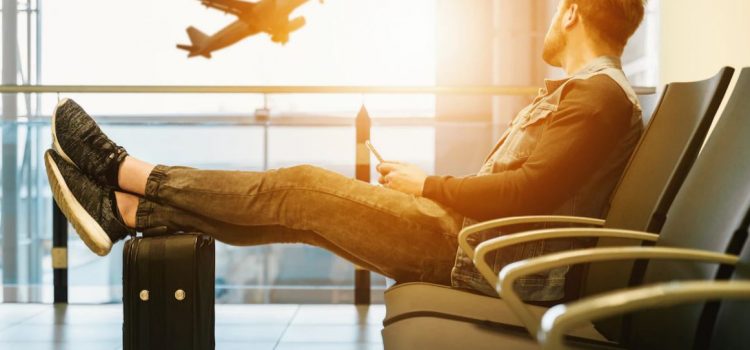

This article gives you a glimpse of what you can learn with Shortform. Shortform has the world’s best guides to 1000+ nonfiction books, plus other resources to help you accelerate your learning.
Want to learn faster and get smarter? Sign up for a free trial here .
What are the top five travel myths? Have you allowed any of these myths to hold you back from traveling?
There are so many misconceptions about travel that deter people from ever setting foot outside their home country. These myths range from the cost of travel to safety concerns to the ability to travel with children.
Here’s why these beliefs, and other myths about travel, are false and shouldn’t hold you back from experiencing what the world has to offer.
Myth 1: Traveling Is Super Expensive
The first, and arguably the worst, travel myth is that traveling is super expensive. While traveling can be expensive, it doesn’t need to be. There’s a great excerpt from Rolf Potts’s book Vagabonding about this topic. He recounts a scene from Oliver Stone’s film Wall Street when a character says, “I think if I can make a bundle of cash before I’m thirty and get out of this racket, I’ll be able to ride my motorcycle across China.” Potts is confused by this scene because he says you “could work for eight months as a toilet cleaner and have enough money to ride a motorcycle across China.”
People have these preconceived notions in their heads that travel is out of their monetary reach. Some people go their whole lives only having gone on one big trip, such as their honeymoon, because they assume travel is beyond their means. This is false, and I can attest to it personally. By the time I was in my mid-20s, I had gone to Asia four times. And trust me when I tell you that I was in no way rich—or even well-off. I was a lower-middle-class citizen paying for an apartment and working an hourly customer service job. If I could make it happen then you can too.
Tips for Cheaper Travel
1. Food and accommodations: If you’re willing to stay in budget accommodations like hostels or cheap hotels instead of luxury resorts, eat street food instead of Michelin-starred meals, and take public transportation instead of private taxis, then you’ve already made traveling exponentially cheaper. That all-inclusive resort may look enticing but think of all the activities you could do with the money you save.
2. Choose your destination carefully: One huge factor to take into consideration when choosing where to travel is the price and currency exchange rate. There are some locations, such as Hawaii, that are going to be pricey no matter where you stay. But if beaches and palm trees are what you’re craving, consider a location like Thailand instead. There, you can rent a scooter for $5 per day and eat a meal for $2.
3. Don’t go overboard with souvenirs: When you’re in a new place, it’s tempting to want to take everything home with you to show your friends and family. However, you should resist the urge and be picky with what you bring home. Remember that the prices of souvenirs are jacked-up for tourists, you may not have space for them in your luggage, and they will create clutter at home. Instead, opt for taking lots of photos—they’re free and they don’t take up space.
Myth 2: Traveling Is Dangerous
Car accidents, pickpockets, wild animals, scams—there’s no shortage of travel horror stories out there. But, fortunately, these incidents are much less likely to happen than you think, especially if you’re prepared and have your wits about you.
Tips for Safe Travel
1. Pickpockets and scams: While traveling, always keep your belongings close to your body and hidden away, don’t display valuable items in public places, avoid walking alone at night, don’t get in a car with strangers, and familiarize yourself with common local scams ahead of time. Basically, it boils down to being mindful, keeping your guard up, and trusting your gut.
2. Vehicle accidents: When it comes to getting in a car or scooter accident while in another country—yes, it can happen. But like the advice above, it’s far less likely to happen if you’re responsible. As a matter of fact, about 69% of accidents happen within a 10-mile radius of your home.
But if you’re nervous, don’t rent a car or scooter if you’re not comfortable driving one. Familiarize yourself with the road rules of the country you’re in, always wear a helmet when on a scooter, and make sure you’re insured just in case.
3. Wild animals: Don’t pet or feed stray dogs, don’t try to feed, coax, or rile up monkeys, and don’t get too close to wild animals. You should appreciate wildlife with your eyes, not your hands.
Sure, there are some dangers when it comes to traveling. But if you take the right precautions and act responsibly, many of those dangers become non-issues.
Myth 3: Traveling Will Make You Sick
Are you afraid of getting food poisoning, picking up a disease, or getting an illness from mosquitos? While these are legitimate concerns, measures can be taken to prevent them.
Tips for Staying Healthy
1. Get vaccinated: Before you travel to places with known diseases such as malaria or yellow fever, make sure to visit a travel clinic and get the necessary vaccines/pills.
2 Use effective insect repellent: When traveling to a tropical area, make sure you have strong insect repellent. It’s a good idea to spray your clothes and gear with Permethrin ahead of time and to bring along a reliable repellant, such as Picaridin (which is also great because it doesn’t have a smell, as opposed to DEET-based products).
3. Check the CDC recommendations: When traveling to certain countries, it’s important to follow CDC guidelines when it comes to food and water. Don’t eat fruits and vegetables without peels, don’t drink the tap water, don’t eat meat that’s been sitting out in a food stall, don’t get ice in your drinks at restaurants, etc. The rules may sound intimidating at first, but you get used to them quickly.
4. Get travel insurance: Because you never know what could happen.
Myth 4: You Can’t Travel With Kids
If you have children, you’ve probably been told at one point that your travel days are over. It seems to be common knowledge that there are only a few places where you can travel with kids, such as Disney. This is a travel myth.
I’ve encountered tons of travelers with kids on my trips. There’s also a huge community of traveling parents and families online that provides advice such as how to fly with kids, how to deal with meltdowns on the road, the best gear for traveling with babies, etc. Some good sources for this information are Baby Can Travel, The Bucket List Family, and Kids on a Plane.
So stop using your kids as a reason not to travel. Both your kids and you will benefit from traveling.
Tips for Traveling With Kids
1. Be flexible: When traveling with kids, plan for everything to take longer than expected. Things will go off-schedule, and that’s okay. Your schedule should be loose and shouldn’t be jam-packed with activities.
2. Pack lots of snacks: Cranky kids will take the enjoyment out of any trip. This is especially important if you’re traveling to a foreign country and your child may be put off by new foods. Having a stock of their favorite snacks readily available will save you a lot of hassle.
3. Contact information: If your child gets lost, it’s important they have some form of contact information on them at all times. This might mean zip-tying your info to their shoelace, but make sure they or whoever finds them have the means to contact you.
Myth 5: Travel Planning Is Complicated
I can’t even count the number of times people have asked me how I plan my trips. For some reason, people think that planning an international trip is complicated and that they need to go through a booking agent or with a tour group. This travel myth is one of the easiest ways to make a trip unaffordable. Tour groups are very expensive and booking agents hit you with tons of fees while trying to coerce you into purchasing packages and add-ons you don’t need.
Tips for Planning a Trip
1. Do it yourself: While it may sound intimidating, the best and cheapest way to plan a trip is to do it yourself. It doesn’t have to be complicated either—thanks to Google, travel bloggers, YouTubers, and other online travel resources. Thankfully, we live in a time where you can easily Google a location and find a suggested itinerary that fits your budget and preferences. For example, if you Google, “How to spend two weeks in Costa Rica,” you’ll find tons of articles that cater to all types of budgets and interests. You’ll find itineraries for beach lovers, thrill-seekers, partiers, families, romance, animal lovers, and the lists go on. All the hard work has been done for you, and it’s at your fingertips—for free.
2. Don’t over-plan: You might be tempted to plan every minute of every day of your trip to ensure that you don’t miss out on anything. Don’t do this. When visiting a new place, it’s important to have the time to explore it. If you’re jumping from one activity to another, then you might miss the opportunity to stop at a cute cafe on the river for brunch. The moments in between the activities can be just as special as the activities themselves.
Not to mention, having a strict itinerary adds stress to your trip. It’s stressful to plan and it’s stressful to stay on a schedule while traveling. However, having no plan at all could mean that you miss out on things you wanted to see/do. Try putting together a loose plan with just a few activities or landmarks you’d like to see, but stay flexible.
Stop Dreaming and Get Out There
Don’t let any of the above travel myths hold you back from living a life full of adventure. You don’t need to save up for one big “trip of a lifetime,” but rather, you can travel to a new country every year or two. With these travel tips, you’ll be the envy of those around you. So stop thinking, “I wish I could,” and do it!

Want to fast-track your learning? With Shortform, you’ll gain insights you won't find anywhere else .
Here's what you’ll get when you sign up for Shortform :
- Complicated ideas explained in simple and concise ways
- Smart analysis that connects what you’re reading to other key concepts
- Writing with zero fluff because we know how important your time is






